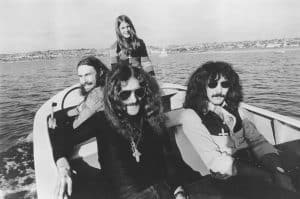6 Classic Rock ‘Supergroups’ and Their Worst Work

Asia / YouTube
Classic rock has a treasure trove of legendary bands, and among them, supergroups hold a unique place. Formed by already-famous musicians, these bands often had high expectations from fans. However, not every album from these supergroups hit the mark. Let’s take a look at six well-known supergroups and the albums that disappointed both critics and fans.
1. Cream – Goodbye
Cream, featuring Eric Clapton, Ginger Baker, and Jack Bruce, is often praised for their powerful sound and musical talent. With hits like “Sunshine of Your Love” and “White Room,” they secured their place in rock history. However, their final studio album, Goodbye, did not live up to the standards set by their previous work.
The album comprises a mix of live and studio recordings, but it feels disconnected and rushed. While some tracks have merit, the overall cohesion and energy fall short of Cream’s earlier albums. Fans and critics alike felt that the band’s growing tensions hindered the quality of this release, making it a weak point in Cream’s short but influential career.
2. The Traveling Wilburys – Traveling Wilburys Vol. 3
The Traveling Wilburys brought together George Harrison, Bob Dylan, Tom Petty, Roy Orbison, and Jeff Lynne, promising an incredible blend of their unique styles. Their first album was a huge success, showcasing the playful creativity and strong songwriting abilities of the members. However, their follow-up effort, Traveling Wilburys Vol. 3, couldn’t capture the same magic.
This album suffered from the absence of Roy Orbison, who had passed away, creating an imbalance within the group. Additionally, the songwriting and production felt less inspired, with some tracks feeling more like outtakes than fully realized songs. While it still holds some decent moments, the album didn’t meet the high standards set by its predecessor.
3. Audioslave – Revelations
Audioslave combined the powerful vocals of Chris Cornell from Soundgarden with the instrumental prowess of Rage Against the Machine members Tom Morello, Tim Commerford, and Brad Wilk. Their debut record received widespread acclaim, blending hard rock with grunge and funk elements. By the time they released Revelations, however, the band seemed to be running out of creative steam.
Revelations presents a polished sound, but it lacks the raw energy and innovative edge of their earlier work. Many of the songs feel formulaic, with repetitive riffs and predictable structures. Fans of the band’s previous albums found this record to be a lackluster effort, leading to the band’s eventual breakup shortly afterward.
4. Bad Company – Rough Diamonds
Bad Company, formed by members of Free and Mott the Hoople, quickly earned fame for their bluesy rock anthems and Paul Rodgers’ distinctive voice. However, by the time they released Rough Diamonds, the band’s creative spark was fading. The album reflects a band that was experiencing internal strife and struggling to maintain their earlier success.
The songs on Rough Diamonds lacked the memorable hooks and powerful grooves that fans had come to expect. While not entirely devoid of merit, the album felt uninspired compared to their classic hits like “Can’t Get Enough” and “Bad Company.” This record marked a low point for Bad Company before they temporarily disbanded.
5. Asia – Astra
Asia formed in the early 1980s, blending progressive rock icons like Steve Howe, John Wetton, Geoff Downes, and Carl Palmer. Their self-titled debut was a commercial hit, featuring catchy melodies and skillful musicianship. By the time they released Astra, however, internal conflicts and lineup changes had taken their toll.
Astra struggled to resonate with fans and critics, lacking the dynamic energy of their earlier work. The songwriting felt middling, and the production seemed overblown, attempting to mask the lack of strong material. This album failed to capture the initial excitement that surrounded the band’s debut and marked a decline in their popularity.
6. The Firm – Mean Business
The Firm featured rock luminaries Jimmy Page of Led Zeppelin and Paul Rodgers of Bad Company, creating quite the buzz in the mid-1980s. Their first album was well-received for its blend of blues-rock and hard rock elements. However, their second album, Mean Business, did not maintain that momentum.
Mean Business lacks the intensity and innovation that fans expected from such experienced musicians. The songs often come across as uninspired, with none of the tracks standing out as memorable hits. The album’s tepid reception signaled the end of The Firm, as they disbanded shortly after its release.













